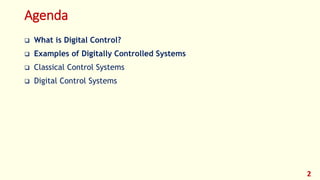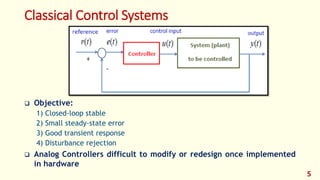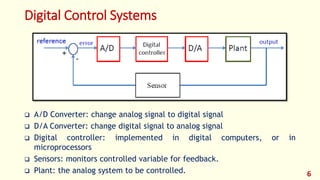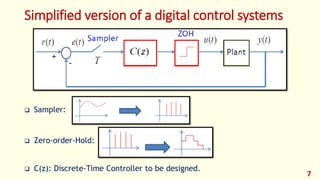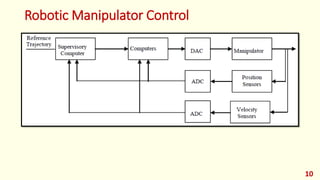Dcs lec01 - introduction to discrete-time control systems
- 1. رَـدْقِـن،،،لمااننا نصدقْْقِنرَد LECTURE (1) Introduction To discrete-Time Control Systems ASCO. Prof. Amr E. Mohamed
- 2. Agenda What is Digital Control? Examples of Digitally Controlled Systems Classical Control Systems Digital Control Systems 2
- 3. What is Digital Control? Automatic control is the science that develops techniques to steer, guide, control dynamic systems. Examples of such dynamic systems are found in biology, physics, robotics, finance, etc. Digital Control means that the control laws are implemented in a digital device, such as a microcontroller or a microprocessor. Such devices are light, fast and economical. Digital control systems = “Digital signals” + ”Control systems” The points that will be examined in these lecture notes are the following: transformation of an already designed continuous-time controller into a discrete- time controller, discretization of continuous systems, direct synthesis of discrete-time control systems, practical considerations and precautions when implementing a digital controller. 3
- 4. Examples of Digitally Controlled Systems Nowadays, digitally controlled systems are everywhere, automotive industry: speed regulators in cars, aeronautic/space industry: autopilots, automatic take off/landing, cruise control chemistry: pharmaceutical industries, oil transformation, liquid level in tanks robotics: robot-arm trajectory control, manipulation, housing: in-house temperature regulation 4
- 5. Classical Control Systems Objective: 1) Closed-loop stable 2) Small steady-state error 3) Good transient response 4) Disturbance rejection Analog Controllers difficult to modify or redesign once implemented in hardware 5
- 6. Digital Control Systems A/D Converter: change analog signal to digital signal D/A Converter: change digital signal to analog signal Digital controller: implemented in digital computers, or in microprocessors Sensors: monitors controlled variable for feedback. Plant: the analog system to be controlled. 6
- 7. Simplified version of a digital control systems Sampler: Zero-order-Hold: C(z): Discrete-Time Controller to be designed. 7
- 8. Why Digital Control? Easy to implement complicated control algorithms Easy to modify the controller Controller parameters unchanged with variations in environment Low cost, low weight, and low power dissipation High noise tolerance 8
- 9. Disadvantages Sampling and quantization process will degrade system performance Software errors Need power supply 9
- 11. Drug delivery Digital Control 11
- 12. 12


